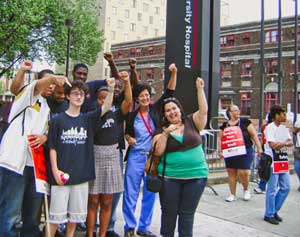Striking nurses battle Temple Hospital’s union busting
By
Betsey Piette
Philadelphia
Published Apr 17, 2010 8:55 AM
The strike at Temple University Hospital in north Philadelphia that began March
31 is heading into its third week. Hospital administrators are demonstrating
their lack of concern over patient safety and are ready to spend whatever it
takes to break the union representing more than 1,500 nurses and
professional/technical staff.
|
Temple students show solidarity with nurses.
WW photo: Berta Joubert-Ceci
|
This key strike’s outcome will impact on all workers in the Philadelphia
area. And solidarity now from other workers and unions will affect the
nurses’ chance for victory.
TUH management tells workers they should accept a contract fraught with
concessions and givebacks because of the economic downturn. Meanwhile, in just
the first week of the strike, management has spent $4.7 million to hire 850
strikebreakers. Scabs’ salaries average $5,500 but can be as high as
$10,000 per week. Bonuses estimated to cost around $100,000 will go to any scab
staying past week one.
Regular weekly payroll costs for TUH’s 1,500 employees would have been
only $2.6 million. The entire four-year contract proposed by the nurses and
allied professionals would have cost the hospital $9 million.
While squandering money to pay scabs more than union workers earn, management
is also spending around $1.7 million for the scabs’ meals and
transportation, including airfare and luxury hotel accommodations and extra
security for people willing to cross the picket line.
The profit going to California based HealthSource Global Staffing, a company
that specializes in providing temporary nursing staff to break strikes across
the country, is $1.1 million a week. Contrast that dazzling amount with the
cost to continue a longstanding tuition benefit for nurses’ dependents
that TUH eliminated last year: only $1.1 million per year.
The Pennsylvania Association of Staff Nurses and Allied Professionals
represents striking TUH nurses. PASNAP is calling on the hospital to document
the credentials of the temporary staff. PASNAP Executive President Patricia
Eakin told Workers World, “Sixty-five percent of Temple’s
admissions come through their emergency room, yet word has gone out that the
hospital is diverting ambulances to other hospitals because of inadequate
staffing.”
PASNAP took 400 striking hospital workers and supporters to the Philadelphia
City Council on April 8 to get city representatives to pass a resolution of
concern over the potential jeopardy to public health from the undertrained scab
workforce. The resolution noted that when the busiest emergency room serving
some of north Philadelphia’s poorest communities cannot open its doors,
it’s a public health crisis.
The striking nurses took over most of the seats in the chamber and upstairs
galleries during the council’s biweekly meeting. Councilwoman Maria
Quinones-Sanchez, the first Latina elected official in Philadelphia, introduced
the resolution supporting the nurses’ strike. But Councilman Darrell
Clarke, who represents the district where TUH is located, then blocked this
resolution from reaching the floor for a vote.
A key contract issue involves the nurses’ concern over patient care. TUH
management wants workers to accept a gag clause that would prohibit them from
saying anything negative about the hospital or voicing concern over patient
care in any public forum. Management’s lead negotiator, Robert
Birnbrauer, told the union bargaining committee: “You want your
constitutional rights. Go somewhere else!”
To expose management’s intention to silence staff, National Nurses
United, with which PASNAP affiliates, took out a full page ad in the
Philadelphia City Paper prominently displaying Birnbrauer’s words.
Growing community support
On April 9 community organizations, including the Philadelphia Student Union,
the Media Mobilizing Project and the Unified Taxi Workers Alliance of
Pennsylvania, brought their members out to join striking nurses on the picket
line.
Mariah Porter with the Philadelphia Student Union told Workers World:
“It’s wrong for them not to get a contract and for the nurses to
not get paid. They need a contract to feed their families.”
PSU member Justin Carter described his organization’s efforts to get
students more of a voice in the school system. He connected the
hospital’s gag order against nurses to the school district’s denial
of students’ right to speak about conditions in their schools. Carter
told the striking nurses, “As long as you are able to stand up,
we’ll stand up with you.”
The students initiated a chant that was popular with everyone on the picket
line: “What’s disgusting? Union Busting!”
Desi Burnette, with the Media Mobilizing Project, reminded people how PASNAP
worked with the community in March 2009 to try to keep open Northeastern
Hospital when Temple University decided to close the facility, which had been
providing care to the surrounding community for 100 years.
Ronald Blount, president of the 1,200 member Unified Taxi Workers Alliance,
joined the nurses’ picket line. Blount was clear that if Temple succeeded
in breaking a union like PASNAP, which represents some of the higher paid
unionized workers in the city, every sector of the work force will lose.
Support from rank-and-file workers for the striking nurses has been evident all
along, from flashed victory signs to the loud honks from passing cars,
ambulances, buses, trucks and taxis every time the nurses hold a rally. But for
PASNAP to defeat management’s union busting campaign, leaders of other
unions have to call on their membership to come out in organized mass public
demonstrations of support, with the clear understanding that an injury to one
is an injury to all.
Articles copyright 1995-2012 Workers World.
Verbatim copying and distribution of this entire article is permitted in any medium without royalty provided this notice is preserved.
Workers World, 55 W. 17 St., NY, NY 10011
Email:
[email protected]
Subscribe
[email protected]
Support independent news
DONATE


